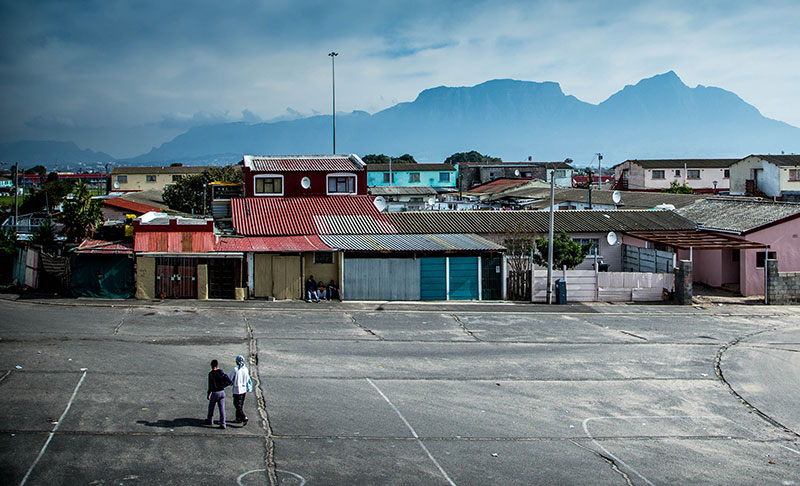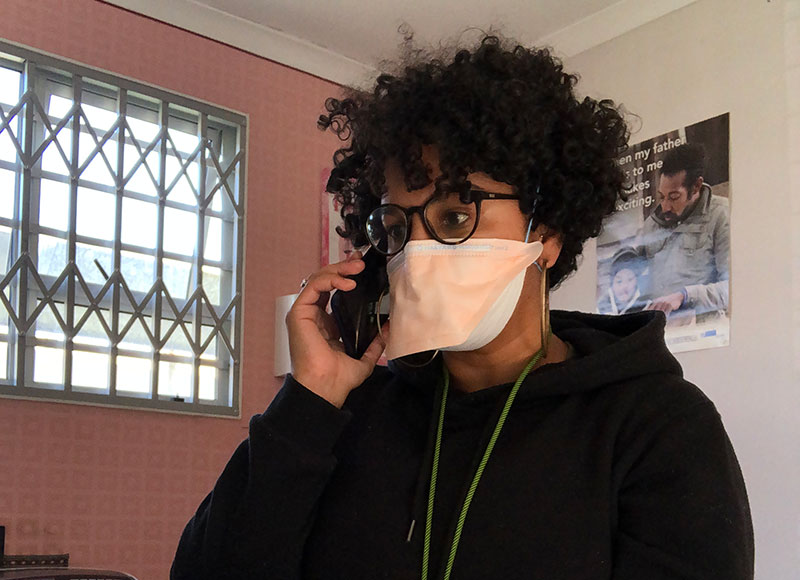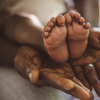COVID-19: Help a click away for struggling young moms
04 May 2020 | Story Helen Swingler. Voice Nash Makado. Read time 7 min.
Enforced isolation in the wake of the COVID-19 pandemic has compounded already high rates of perinatal depression and anxiety among many new and young mothers in low- and middle-income communities. But the recently launched platform Messages for Mothers (M4M) by the Perinatal Mental Health Project (PMHP) , based at the University of Cape Town’s (UCT) Alan J Flisher Centre for Public Mental Health in the Department of Psychiatry and Mental Health, is changing that.
PMHP, which was established in 2002, provides mental health services to pregnant and postnatal women.
M4M is a one-stop online resource developed in response to COVID-19 and the lack of targeted messaging for vulnerable mothers who are concerned for their children, families and themselves, said PMHP director, Associate Professor Simone Honikman.
In creating M4M, the PMHP teamed up with other organisations that work closely with mothers and have resources and experience in supporting mothers. These are Embrace, Flourish, Grow Great and Side by Side.
Many of the women they are targeting also face overcrowding, gender-based violence and food insecurity. On the M4M website, these women can find immediate help and information in three main areas: maternal and mental health, physical health, and parenting in the pandemic.

The platform curates simple content that answers common questions like “Must I wear a mask? Will I get a child support grant? How do I explain COVID-19 to my children?”, and provides links to essential advice, information and support. Besides physical health, parenting and mental health – including some resources on domestic violence – it offers specially crafted mindfulness podcasts and helpline repositories.
M4M’s work continues PMHP’s core mission, said Honikman.
This is to support the integration of quality maternal mental healthcare into mother and child initiatives in low- and middle-income settings. To accomplish their mission, they have four focus areas: advocacy for action, strengthening of maternal mental healthcare systems, generating knowledge and building the capacity of service providers.
High depression and anxiety rates
The stakes are high, said Honikman.
“Prior to COVID-19, the prevalence of depression and anxiety in pregnant and postnatal women was about one in three.”
“Prior to COVID-19, the prevalence of depression and anxiety in pregnant and postnatal women was about one in three. For each mental health condition separately, the rate was about one in five, but there’s a lot of co-morbidity. This is based on PMHP’s research at our service site in the Hanover Park Midwife Obstetrics Unit where we used diagnostic tools to assess for these mental health conditions.”
In communities such as Hanover Park, social dysfunction is characterised by high drug and alcohol abuse, gang wars, food insecurity and gender-based violence.
“We also want to address domestic violence as there has been an enormous escalation of this since lockdown, and the negative associations with mental health and maternal health, and child physical outcomes are well documented.
“There are so many terrifying things for under-resourced mothers to cope with.”
“Besides caring for young children under strained circumstances, there are so many terrifying things for under-resourced mothers to cope with.”
Honikman hopes the resources M4M provides will filter down into mother and caregiver networks.
‘Kind and supportive’
Mothers who access the M4M website are welcomed in an introductory video. Leaders of the alliance partners share a warm welcome and expressions of solidarity from their own homes or community settings.

“We’ve created M4M to help share the load by sharing information, tips and advice in a space that is evidence-based, kind and supportive,” explained the PMHP’s Liesl Hermanus.
During the lockdown, Hermanus still conducts telephonic counselling with existing clients and face-to-face sessions with “very vulnerable clients” or those without access to privacy or private phones. High-risk women are referred by midwives on a case-by-case basis.
To offset the limitations of high data costs, M4M has developed shorter graphic message versions of their articles. They’ve also used technology to shrink their audio resources, such as the mental health and mindfulness podcasts.
“We’re actively campaigning that the materials are made available on zero-rated websites.”
“We’re actively campaigning that the materials are made available on zero-rated websites and on the National Department of Health WhatsApp line,” Honikman noted. “We plan now to move into a phase of getting the messages out on radio, either as pre-recordings that can be prepared or with live interviews with experts who speak a range of South African languages.”
Since starting the M4M campaign, the most clicked resources have been:
- FAQ physical health
- Messages for Mothers – In response to COVID-19
- Managing family violence during COVID-19.
Working with other partners, Honikman is also helping to develop the messaging component of the “National Framework and Guidelines for Maternal and Neonatal Care During a Crisis: COVID-19 response” for the director of Maternal and Neonatal Health at the National Department of Health, Dr Manala Makua.
This component has been designed to be adapted for potential future crises.
Updated: 11 September 2025
 This work is licensed under a Creative Commons Attribution-NoDerivatives 4.0 International License.
This work is licensed under a Creative Commons Attribution-NoDerivatives 4.0 International License.
Please view the republishing articles page for more information.
UCT’s response to COVID-19
COVID-19 is a global pandemic that caused President Cyril Ramaphosa to declare a national disaster in South Africa on 15 March 2020 and to implement a national lockdown from 26 March 2020. UCT is taking the threat of infection in our university community extremely seriously, and this page will be updated with the latest COVID-19 information. Please note that the information on this page is subject to change depending on current lockdown regulations.
Minister of Health, Dr Joe Phaahla, has in June 2022 repealed some of South Africa’s remaining COVID-19 regulations: namely, sections 16A, 16B and 16C of the Regulations Relating to the Surveillance and the Control of Notifiable Medical Conditions under the National Health Act. We are now no longer required to wear masks or limit gatherings. Venue restrictions and checks for travellers coming into South Africa have now also been removed.
Read the latest document available on the UCT policies web page.
Campus communications
2022
UCT Community of Hope Vaccination Centre
On Wednesday, 20 July, staff from the University of Cape Town’s (UCT) Faculty of Health Sciences came together with representatives from the Western Cape Government at the UCT Community of Hope Vaccination Centre at Forest Hill Residence to acknowledge the centre’s significance in the fight against COVID-19 and to thank its staff for their contributions. The centre opened on 1 September 2021 with the aim of providing quality vaccination services to UCT staff, students and the nearby communities, as well as to create an opportunity for medical students from the Faculty of Health Sciences to gain practical public health skills. The vaccination centre ceased operations on Friday, 29 July 2022.
With the closure of the UCT Community of Hope Vaccination Centre, if you still require access to a COVID-19 vaccination site please visit the CovidComms SA website to find an alternative.
“After almost a year of operation, the University of Cape Town’s (UCT) Community of Hope Vaccination Centre, located at the Forest Hill residence complex in Mowbray, will close on Friday, 29 July 2022. I am extremely grateful and proud of all staff, students and everyone involved in this important project.”
– Vice-Chancellor Prof Mamokgethi PhakengWith the closure of the UCT Community of Hope Vaccination Centre, if you still require access to a COVID-19 vaccination site please visit the CovidComms SA website to find an alternative.
Frequently asked questions
Global Citizen Asks: Are COVID-19 Vaccines Safe & Effective?
UCT’s Institute of Infectious Disease and Molecular Medicine (IDM) collaborated with Global Citizen, speaking to trusted experts to dispel vaccine misinformation.
If you have further questions about the COVID-19 vaccine check out the FAQ produced by the Desmond Tutu Health Foundation (DTHF). The DTHF has developed a dedicated chat function where you can ask your vaccine-related questions on the bottom right hand corner of the website.
IDM YouTube channel | IDM website
“As a contact university, we look forward to readjusting our undergraduate and postgraduate programmes in 2023 as the COVID-19 regulations have been repealed.”
– Prof Harsha Kathard, Acting Deputy Vice-Chancellor: Teaching and Learning
We are continuing to monitor the situation and we will be updating the UCT community regularly – as and when there are further updates. If you are concerned or need more information, students can contact the Student Wellness Service on 021 650 5620 or 021 650 1271 (after hours), while staff can contact 021 650 5685.




















